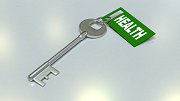Subscribe to our periodic newsletter and get latest, relevant information on healthy living
What is High Blood Pressure?
High blood pressure or hypertension is a long-term, chronic rise in pressure exerted by circulating blood on the artery walls as a normal response to stress and physical activity. However, if this pressure remains persistently high (high blood pressure as it is called), it can overwork your heart and arteries, making arterial disease, heart attacks and strokes more likely. Most cases of hypertension have no signs and symptoms and primary means to detect is by checking your blood pressure with healthcare provider or with reliable, accurate at-home blood pressure measurement kit. Nonetheless, it’s best to have it measured by professional healthcare provider for accurate blood pressure values.

Blood Pressure Measurement
Medical practitioners record blood pressure as two values, the systolic (the pressure of the blood as it enters the aorta from the heart) and the diastolic (the pressure when the heart ventricles relax between beats). It is measured in millimeters of mercury (mm Hg). High blood pressure or hypertension is defined in an adult as a blood pressure greater than or equal to 140 mm Hg systolic pressure, or greater than or equal to 90mm Hg diastolic pressure. However, a blood pressure reading above 140/90 indicates hypertension and is considered abnormal at any stage. Blood pressure is measurement of force of blood on the walls of major arteries in the body and is in practice measured in the arms to gauge arterial blood pressure.
In general, one should try to keep your blood pressure under 130/85 mm Hg. Normal or ideal blood pressure is 120/80 mm Hg. Additionally, it’s critical how blood pressure is determined for accurate measurement. One should sit quietly and still for at least 5 minutes, measure blood pressure on one’s dominant bare arm that is free of any clothing or constrictions with arm at heart level, and legs bend at knee, but no crossing of legs. Such measurement leads to resting, sitting blood pressure values which as mentioned above should be less than 130/85 mm Hg according to latest guidelines by American Heart Association. Moreover, blood pressure varies minute by minute and is greatly affected by various factors such as body position, medications, level of stress in body, hormones, time of the day, temperature of the ambient air, and use of right size blood pressure cuff.
 Coronary heart disease leading to heart attack along with stroke, kidney damage, vision problems, and arteriosclerosis are the main harms that can be caused by high blood pressure. Hence, we can realize the fact that high blood pressure can easily play with the lives of adults. High blood pressure can occur in both children as well as adults, especially if those individuals are overweight or obese. However, people above 35 years of age, have a greater chance of being affected by high blood pressure. It is mostly common in African-Americans, middle-aged and elderly people, obese people, heavy drinkers, and women who take birth control pills. People suffering from diabetes mellitus, gout or kidney diseases are also prone to high blood pressure.
Coronary heart disease leading to heart attack along with stroke, kidney damage, vision problems, and arteriosclerosis are the main harms that can be caused by high blood pressure. Hence, we can realize the fact that high blood pressure can easily play with the lives of adults. High blood pressure can occur in both children as well as adults, especially if those individuals are overweight or obese. However, people above 35 years of age, have a greater chance of being affected by high blood pressure. It is mostly common in African-Americans, middle-aged and elderly people, obese people, heavy drinkers, and women who take birth control pills. People suffering from diabetes mellitus, gout or kidney diseases are also prone to high blood pressure.
Also, high blood pressure can also run in families or has genetic component. So if your parents have a history of high blood pressure, try to keep an eye on your pressure and it may arise due to your genes. Most cases of high blood pressure are called essential, primary or idiopathic hypertension since their exact cause remains unclear. Interestingly, hypertension can also be due to several other medical conditions like kidney diseases, adrenal gland tumors, overactive or dysfunctional thyroid gland, birth defects in blood vessels, use of illegal drugs like cocaine or amphetamines, and certain medications like birth control pills, chronic use of corticosteroids, some pain relievers, decongestants and other medications. Always check for potential side effects or drug-drug interactions with your pharmacists or healthcare provider that can cause high blood pressure. Hypertension due to underlying medical conditions or use of certain medications is called secondary hypertension. The treatment and prognosis of primary versus secondary hypertension are different and can vary according to other co-existing health conditions.
High blood pressure can also be contributed by high stress and tension levels. Therefore, it is important to reduce stress if there is a genetic connection to high blood pressure. Get regular, brisk exercise or lead active lifestyle and eat a healthy diet. Check your blood pressure regularly and take necessary steps before it damages your heart and blood vessels.


